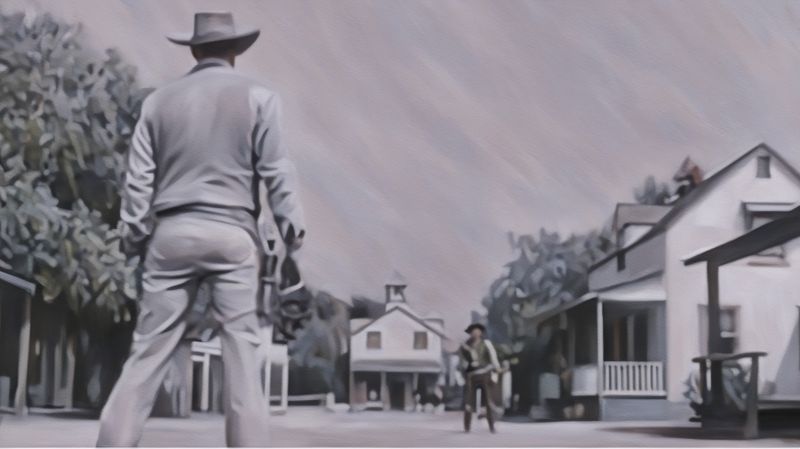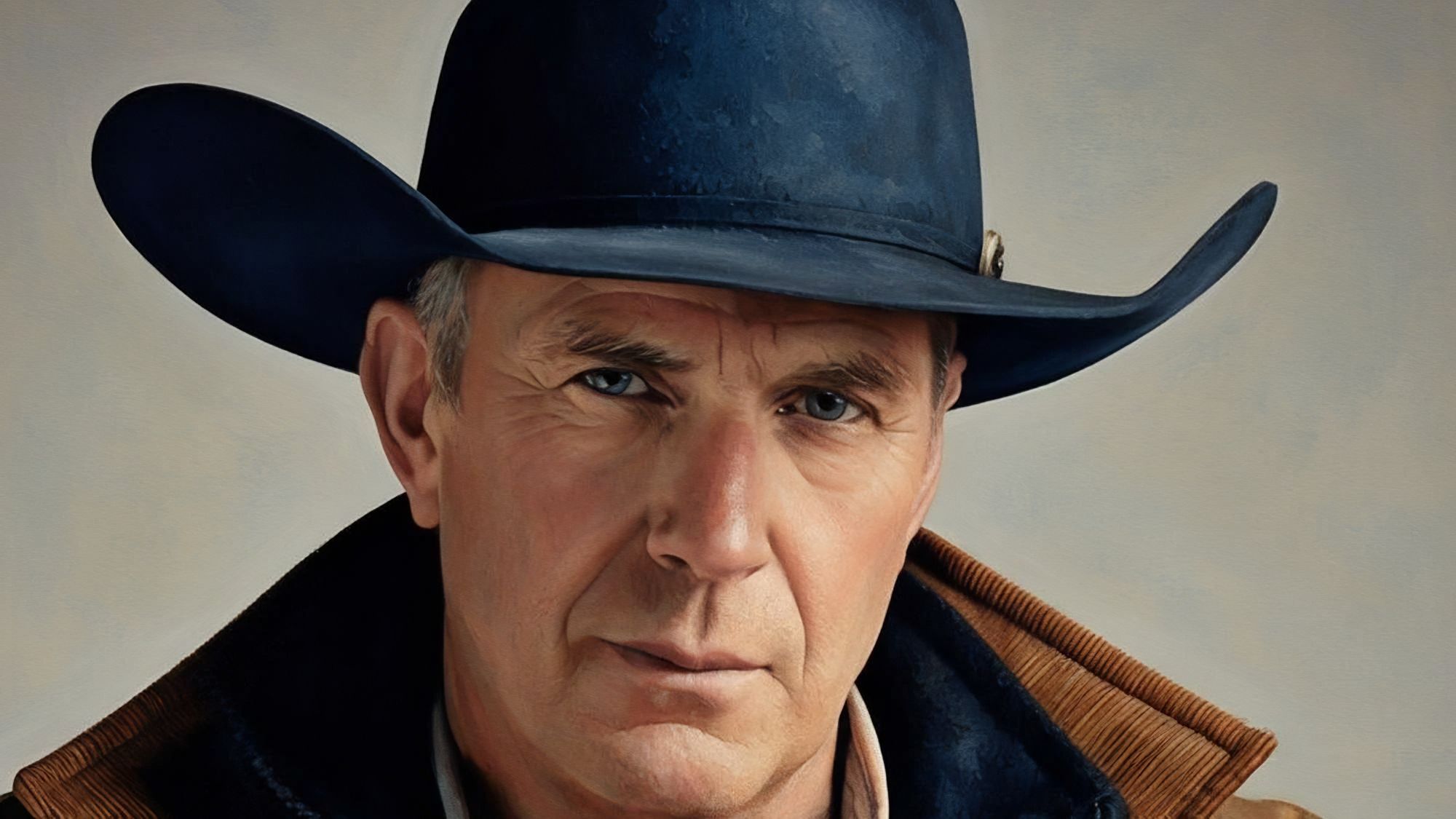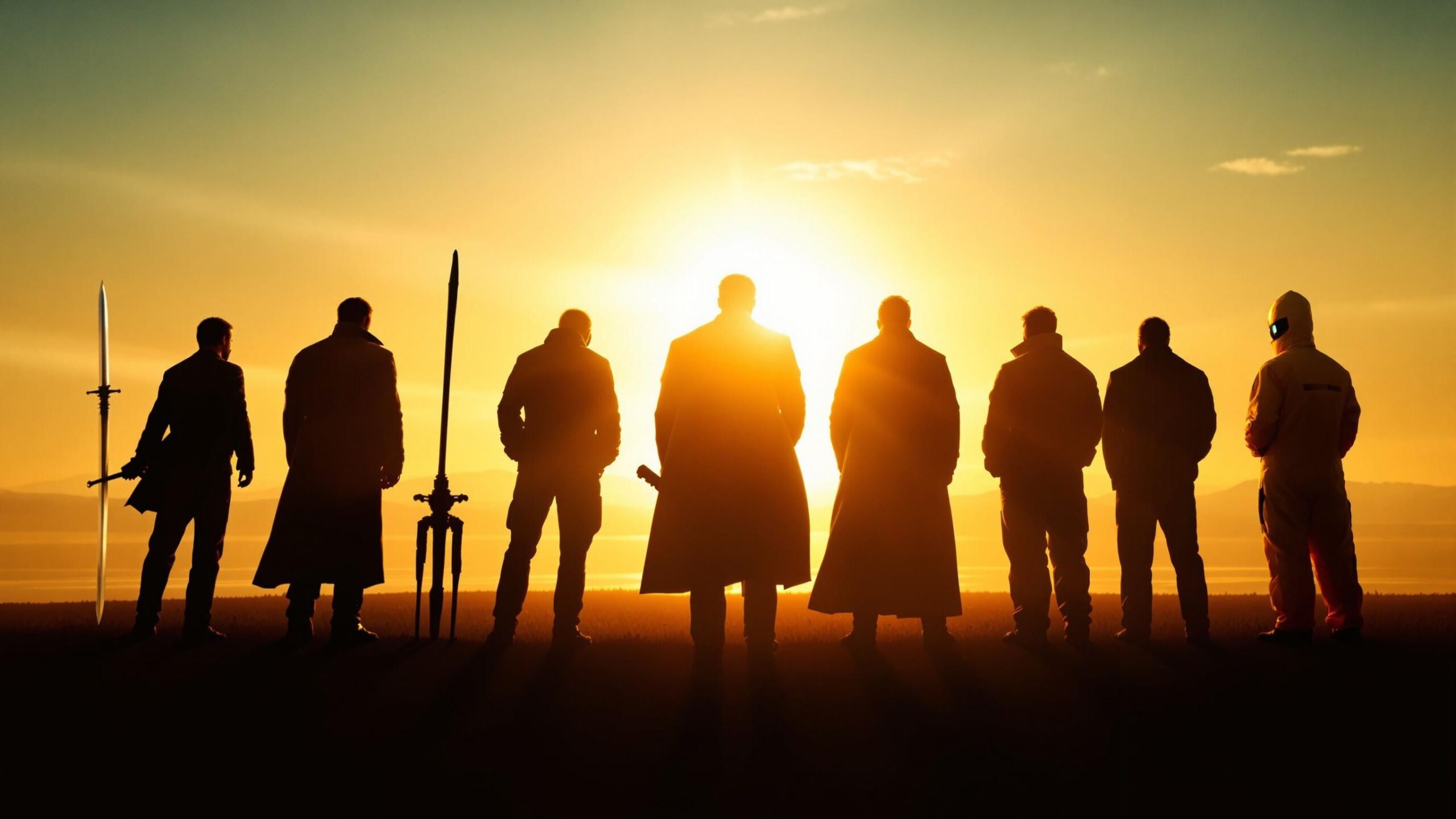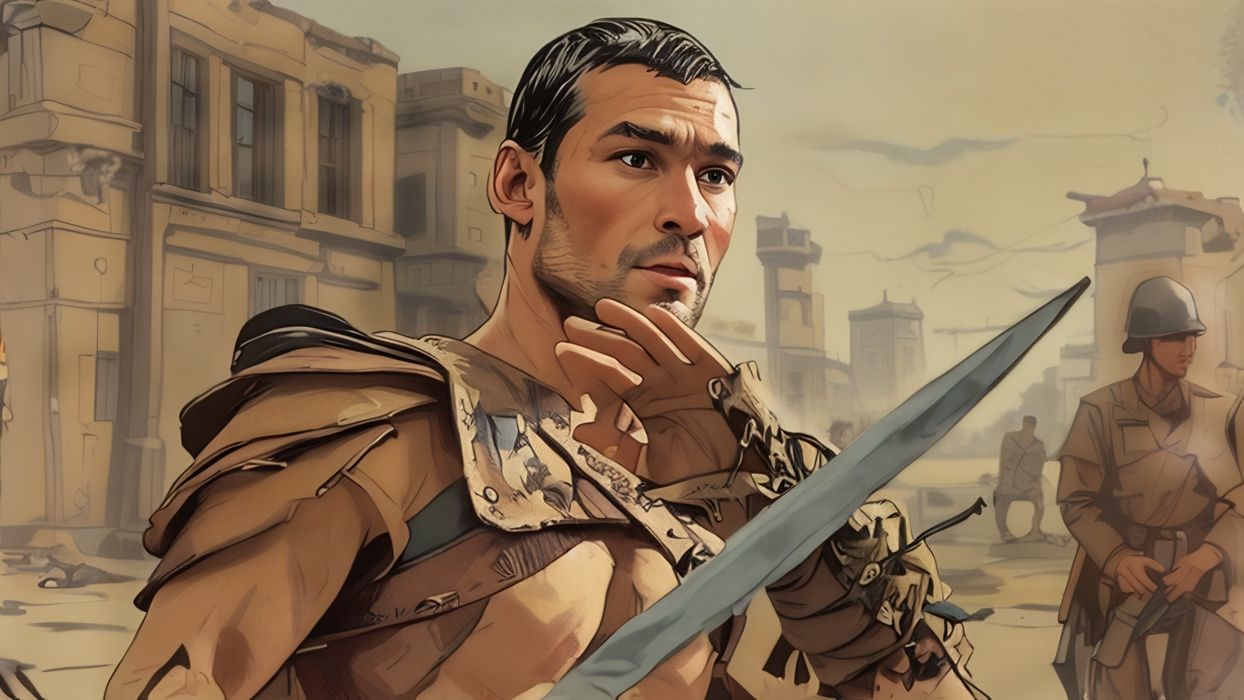Marshal Matt Dillon of Gunsmoke wasn’t just another Western gunslinger—he was the embodiment of law and order in a land where rules were written with bullets and justice was often left to the bravest man standing. Played with quiet authority by James Arness, Dillon ruled Dodge City not with an iron fist, but with a strong moral compass and a steady hand. Whether staring down a ruthless outlaw, protecting townsfolk from greedy land barons, or taking the moral high ground even when it cost him personally, Matt Dillon stood as the frontier’s final line of defense. Over the show’s historic 20-season run, he delivered countless moments of heroism that defined him as one of television’s most enduring and respected figures. These ten standout moments showcase Dillon’s bravery, sacrifice, and the legacy of a true Western hero.
#10: Facing a Mob to Protect a Young Prisoner (Season 5, “The Ex-Con”)
In one of the most morally complex episodes of Gunsmoke, Dillon finds himself standing between an angry mob and a reformed young man recently released from prison. The townsfolk are convinced the boy will return to his criminal ways and want to drive him out—or worse. But Matt believes in second chances and justice that isn’t delivered by fear or prejudice. As the town turns volatile, Dillon holds firm, risking not only his badge but his life to protect someone who has no one else.
This is classic Matt Dillon: calm under pressure, even when the enemy isn’t some hardened outlaw with a gun, but ordinary citizens drunk on mob justice. He speaks softly but with conviction, challenging the townspeople to see the difference between past mistakes and future potential. When tensions hit a boiling point, Dillon doesn’t reach for his gun first. He reaches for reason, for fairness, and for the belief that people can change.
By placing himself between the mob and the boy, Dillon reasserts what lawmen should stand for—not just order, but compassion. The boy is ultimately given a chance to prove himself, and the town is forced to reflect on its own quick judgment. It’s not the kind of heroism you can measure in bullets or bravado, but it’s the kind that sticks with you. Dillon’s refusal to back down in the face of injustice—even when it’s unpopular—makes this one of his quietest yet most powerful acts of heroism.
#9: Riding Into a Blizzard to Save a Trapped Family (Season 9, “The Coldest Day”)
When a fierce blizzard strikes Dodge City, most folks hunker down in the warmth of their homes. But when word comes that a family is trapped out on the prairie, Matt Dillon doesn’t hesitate—he saddles up and rides straight into the storm. What follows is one of the most physically grueling and emotionally resonant episodes of Gunsmoke, as Dillon battles not just nature, but time, isolation, and fatigue to reach a mother and her children before they freeze to death.
The journey itself is harrowing. Icy winds cut visibility to near zero, and Dillon’s horse nearly collapses in the deep snow. He pushes forward anyway, using every ounce of willpower to navigate the storm. When he finally reaches the cabin, the family is barely clinging to life. Without rest, Dillon builds a fire, tends to frostbite limbs, and, in one of the episode’s most touching moments, holds the youngest child in his arms through the night to keep her warm.
This act of heroism goes beyond enforcing the law—it’s about community, compassion, and grit. Most lawmen wouldn’t leave town in such conditions. Matt Dillon doesn’t just leave—he conquers the elements to do what’s right. It’s a raw reminder that heroism doesn’t always come with fanfare or shootouts. Sometimes, it’s just a man and his horse, fighting through snow and silence to save lives that others might forget. And that’s the kind of courage that made Dillon a legend.
#8: Staring Down a Corrupt Judge (Season 12, “The Trial of Marshal Dillon”)
Even in the wild frontier, some enemies wore robes instead of bandanas—and in this unforgettable episode, Matt Dillon squares off against one of the most dangerous threats to justice: a corrupt judge. After arresting a powerful rancher for murder, Matt finds himself up against a judge who’s been bought off and is working to sabotage the case from the inside. The courtroom turns hostile fast, and Dillon is suddenly the one being accused of misconduct.
Instead of backing down, Matt uses the trial as a platform. He calmly dismantles the judge’s facade in front of the jury, calling attention to contradictions, unfair procedures, and outright bribery. But it’s not just about proving the judge is crooked—it’s about showing the people of Dodge that the law has to mean something, even when it’s difficult. Dillon knows that confronting the judge publicly could cost him everything, but he refuses to let injustice prevail, even when it wears a badge of authority.
This is one of the series’ most gripping displays of moral fortitude. Dillon isn’t just risking his job—he’s putting his very reputation on the line to ensure that justice isn’t defined by power, but by truth. When the judge is eventually exposed and removed, the moment feels like more than a victory for the Marshal—it’s a win for every honest lawman who ever had to fight a system that didn’t fight fair. In a world where law and lawlessness often walk the same dusty trail, Dillon’s refusal to bend reminds us why he’s the one who carries the star.
#7: Dismantling a Lynching Party from Within (Season 8, “Quint’s Trail”)
When a wrongful accusation spirals into a manhunt, Marshal Dillon finds himself in one of the most precarious and morally volatile positions of his career. A group of angry townsfolk, convinced that a young man named Quint is guilty of murder, form a posse to carry out frontier justice on their own terms. Rather than confront the group from the outside, Dillon embeds himself within the lynch mob, walking among them not as their leader, but as their conscience.
What makes this moment heroic is how subtly Matt maneuvers. He listens without immediately judging, absorbs their anger, and slowly begins to turn the tide by planting seeds of doubt. With each conversation, he chips away at the certainty that fuels mob mentality, asking the hard questions no one else dares to speak. He challenges their sense of justice with calm logic and reminders of the rule of law. When the moment of truth arrives, and the noose is nearly around Quint’s neck, Dillon steps forward—not with a gun drawn, but with undeniable truth.
In doing so, he not only saves an innocent man, but also saves the townspeople from becoming murderers themselves. He doesn’t shame them; he guides them back to their better judgment. This moment showcases Dillon’s strength not just as a lawman, but as a moral anchor. His heroism here isn’t explosive—it’s transformational. He walks into the heart of rage and fear and walks out with justice intact, proving that sometimes, the bravest thing you can do is make people see what they’ve forgotten.
#6: Going Unarmed into an Outlaw Hideout (Season 6, “The Peace Officer”)
Sometimes, the most heroic act is to face danger with nothing but courage and conviction—and that’s exactly what Matt Dillon does when he enters an outlaw hideout completely unarmed to prevent a bloodbath. The town’s young deputy has been taken hostage by a gang of seasoned criminals, and tensions are high. The townsfolk want a full assault. But Dillon, ever the calm strategist, knows that violence will only get the deputy killed. So, he makes a bold call: he’ll walk in alone, without a weapon, to negotiate the release.
The scene crackles with tension as Matt steps into the den of outlaws, his reputation preceding him. They expect fear or aggression. Instead, they get honesty. Dillon appeals to their logic, their pride, and even their humanity, playing each member against the other with measured words and subtle cues. He talks to the leader like an equal, gaining just enough ground to break the group’s unity—and eventually convinces them to let the deputy go.
It’s a scene that underscores Dillon’s unique strength. He doesn’t just command respect with his gun—he earns it with his mind. He walks out with the deputy alive, and not a single shot fired. In the Old West, where a fast draw is often the first solution, Dillon’s refusal to escalate—despite immense personal risk—makes this moment unforgettable. It’s a testament to his belief in diplomacy over destruction, and it remains one of the purest demonstrations of bravery in the entire series.
#5: Taking a Bullet for Doc Adams (Season 7, “The Wounded Healer”)
Marshal Dillon’s loyalty to his friends has always been unshakable, but in “The Wounded Healer,” it’s tested in the most dramatic way possible. When a bitter enemy from Doc Adams’ past returns seeking vengeance, the man sets a trap intending to kill the doctor in cold blood. Matt, sensing danger, positions himself close by—and when the ambush springs, he throws himself in front of Doc, taking the bullet that was meant to kill his friend.
The scene is as sudden as it is heartbreaking. Dillon collapses to the ground, bleeding heavily, while Doc frantically works to save the very man who just saved him. The reversal of roles—the healer now fighting to preserve the protector—is deeply emotional, and the bond between the two men shines through in every strained word and anxious glance.
This episode peels back the layers of Matt’s heroism. It’s not just about duty—it’s about love and loyalty. He’s willing to die for his friends without hesitation. There’s no time to weigh the odds. There’s just instinct, and Matt’s instinct is always to shield those he cares about. Even while recovering, he doesn’t complain or seek praise. He simply accepts it as part of the job—a price he’s willing to pay so others don’t have to.
It’s one of the show’s most poignant portrayals of sacrifice, and a moment that reaffirms why Dillon was so beloved. Heroism isn’t always about-facing villains—it’s about standing between them and the people you cherish, no matter the cost.
#4: Stopping a Range War with Words, Not Bullets (Season 11, “Hostage!”)
In the tense, powder-keg episode “Hostage!”, Matt Dillon proves once again that true strength often lies in restraint. A simmering land dispute between two cattle barons threatens to erupt into a full-blown range war. When one faction takes hostages—including women and children—in a desperate power play, the situation teeters on disaster. Townspeople clamor for armed retaliation. Emotions are high, tempers are flaring, and gunpowder is seconds from sparking. But Matt Dillon stands firm—and instead of reaching for his Colt, he uses something far more powerful: reason.
Refusing to lead a charge that would cost innocent lives, Matt enters the heart of the dispute alone. He negotiates directly with the men holding the hostages, fully aware that one wrong word could get him killed. But with his signature cool, he dissects their motivations, appeals to their pride, and reminds them of the human cost. Slowly, he peels away the layers of anger until only fear and desperation remain. With calm, measured language and a few hard truths, Dillon convinces the leader to stand down.
When the hostages are released, and the would-be war is averted, there’s no parade—just quiet relief and respect. What makes this moment heroic is its rejection of violence in a show filled with it. Dillon’s refusal to turn Dodge into a battlefield, even when goaded by both sides, is the mark of a true leader. He could have stormed in with force. Instead, he walked in with nothing but his voice—and walked out having saved a town from bloodshed. In a world where might often made right, Dillon reminded everyone that real justice listens before it fires.
#3: Upholding Justice Despite Personal Grief (Season 10, “The Widow”)
In “The Widow,” Matt Dillon is thrust into one of the most emotionally devastating dilemmas of his life. After the sudden death of a close friend during a routine arrest, the man’s widow falsely accuses another innocent citizen out of anger and grief. The town rallies behind her, sympathetic to her loss and eager for swift justice. But Dillon knows the truth—and he also knows that exposing it will destroy the grieving woman’s credibility and further inflame the town.
Still, he does what only he can: he follows the evidence. As he digs deeper, it becomes clear that the man died by accident, and no one was to blame. But telling the truth will make him a villain in the eyes of the widow and the public. Despite the emotional toll, Dillon holds a public inquest, calmly but firmly presenting the facts. He allows the widow to speak, giving her dignity, and then gently reveals the truth. It’s a painful moment—one that costs him dearly in public opinion—but it’s the right thing to do.
This episode showcases Dillon’s deepest integrity. He doesn’t bend for popularity. He doesn’t take the easy road, even when his heart is breaking. Upholding justice in the face of personal loss is no small task, but Matt carries it like he carries everything else—with stoic honor. This moment isn’t loud, but it echoes: doing the right thing doesn’t always feel heroic—but that’s what makes it matter even more.
#2: Defending a Wrongfully Accused Native American (Season 13, “The Iron Bloodline”)
In the racially charged episode “The Iron Bloodline,” a Native American man named Red Moon is accused of killing a white settler. The townsfolk, stirred by prejudice and fear, call for immediate justice—meaning a hanging without trial. But Matt Dillon sees what others refuse to: inconsistencies in the evidence, and a man who, despite being silent and stoic, radiates innocence. In standing up for Red Moon, Matt isn’t just fighting injustice—he’s fighting centuries of systemic bias, and he knows it won’t win him any friends.
Still, he insists on a full investigation. He conducts interviews, retraces Red Moon’s path, and in a pivotal moment, confronts the real killer—a white rancher hoping to cover his tracks. But even after securing proof, the townspeople refuse to accept it. So, Matt brings Red Moon to the saloon, gathers the crowd, and lays out the truth in full. The tension is thick—guns are drawn, voices raised—but Dillon stands his ground, unwavering.
When the mob finally disperses, and Red Moon walks free, it’s not just a victory for one man—it’s a triumph for principle. This moment is Dillon at his finest: risking his life and legacy to protect someone the world wants to forget. His quiet courage in the face of cultural hatred reminds us that heroism isn’t about winning—it’s about standing up, even when you stand alone.
#1: Choosing Duty Over Love (Season 20, “The Sharecroppers”)
The final season of Gunsmoke brings Matt Dillon to one of his most personal crossroads. After years of solitude and sacrifice, he’s offered a rare chance at happiness—a chance to leave Dodge, hang up his badge, and start a life with a woman who loves him and wants to build a future together. It’s everything he’s never had, everything he’s never allowed himself to want. And for a moment, he considers it.
But then trouble comes calling once more. A struggling family of sharecroppers is being harassed by a local landowner, and no one else is willing to intervene. Matt realizes that walking away now would leave them defenseless—and Dodge without its guiding hand. So, he makes the hardest decision of all. He says goodbye to the woman who offers him peace and chooses duty once again.
It’s not a grand gesture. It’s not explosive. It’s just one man making the loneliest, most noble choice possible. And in that moment, viewers understood everything about Matt Dillon: that his life was never about personal reward—it was about doing what was right, over and over, no matter how much it cost him. This final act of sacrifice cements his legacy not just as a lawman, but as a moral titan of the West.
Marshal Matt Dillon didn’t wear his heroism on his sleeve—it was etched into every choice he made, every life he protected, and every injustice he stood against. Across two decades, he faced down danger, defied corrupt systems, and bore the weight of duty with dignity and grace. These ten moments show that true Western heroism isn’t about shootouts or swagger—it’s about quiet strength, unshakable values, and the courage to stand alone when the world demands compromise. In a dusty town where law was still finding its legs, Matt Dillon stood tall—and still does, in the annals of television’s greatest heroes.




